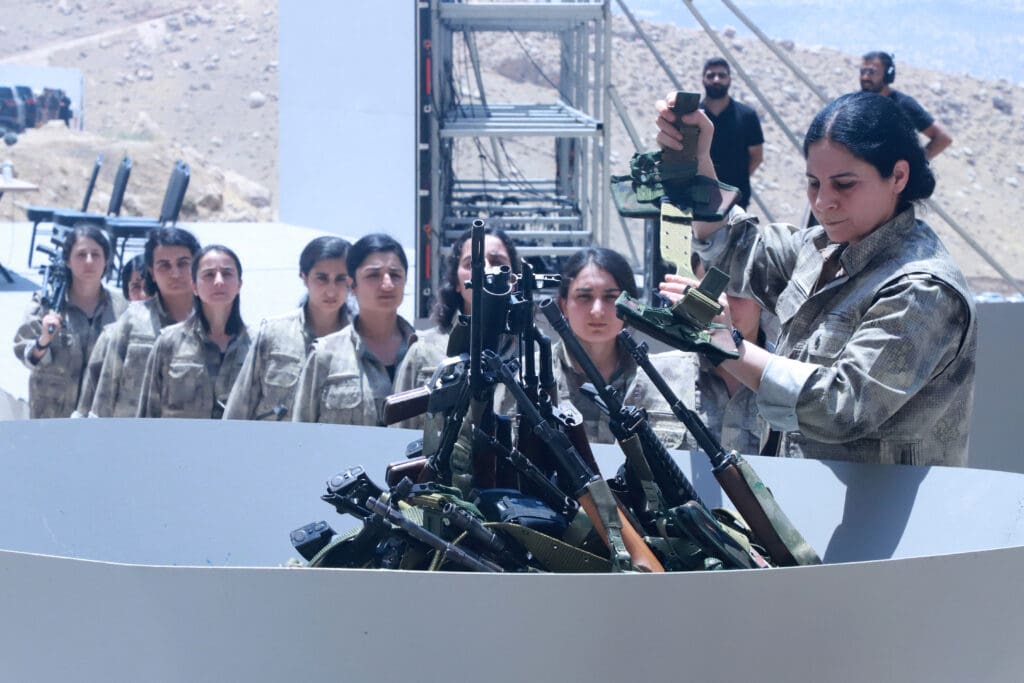When a group of Kurdistan Workers’ Party (PKK) fighters set fire to their weapons at a ceremony in the Iraqi city of Sulaymaniyah in July, it was more than a historic image. It was one of the most prominent steps so far toward ending an intractable conflict that has claimed more than 40,000 lives, reshaped Turkish politics, and spilled across borders into Iraq and Syria. But this was not the first attempt at peace. Whether the latest endeavor succeeds or not will depend on events in two distinct but intertwined arenas: parliamentary politics in Ankara and the shifting geopolitical landscape of the wider region. Together, these forces could either push the process forward or pave the way for its failure.
Turkish President Recep Tayyip Erdogan’s decision to reopen dialogue with Kurdish forces seems driven less by vision than by political necessity. With his Justice and Development Party (AKP) weakened by recent local election setbacks and constitutional limits on his presidency looming, he is seeking new allies to secure constitutional changes that could extend his rule beyond 2028—making the support of the pro-Kurdish Peoples’ Equality and Democracy (DEM) party potentially decisive. For the first time in years, the ruling AKP and the pro-Kurdish opposition share short-term interests. Yet, such expedient alignments are fragile. If Erdogan gains constitutional changes without meaningful concessions on Kurdish rights, the process may collapse. On the other hand, if reforms on issues like mother-tongue education or citizenship materialize, peace could gather its own momentum—notwithstanding developments in neighboring Iraq and Syria.
The process started in October, when Erdogan’s nationalist ally Devlet Bahçeli, leader of the Nationalist Movement Party (MHP) and an opponent of the previous peace process, made a surprise call for a resolution to the issue during a speech in the Turkish parliament. Subsequently, the MHP and the DEM have tried to shape the political and social environment to make the talks possible, signaling that serious negotiations are underway that may lead to a permanent solution. The ongoing process gives the impression that secret talks have set the agenda, laying the way for a second phase involving a commission with representatives from major political parties.
The process has been branded as “Terror Free Türkiye,” framing the issue primarily as one of terrorism rather than of ethnic inequality. In the past, such wording would have been contentious, as it delegitimized the PKK’s demands by portraying it solely as a terrorist group. Yet this time, the Kurdish side has not objected, suggesting to Turkish audiences that the state holds the upper hand in negotiations. This may have been a deliberate choice by Turkish policymakers, marking a shift from acknowledging the existence of the “Kurdish Question” to boiling the problem down solely to one of terrorism. Still, there is hope that the negotiations could address issues of equal citizenship and a rights-based, sustainable resolution that goes beyond merely ending the violence.
In August, the Turkish parliament established a 51-member “National Solidarity, Brotherhood and Democracy Committee” to oversee the initiative, including all major parties except the nationalist İYİ (Good) Party. The decision of the Republican People’s Party (CHP) to join was particularly striking: despite the risk of backlash from nationalist supporters and those with memories of failed ceasefires, the party sees democratization as essential to a lasting settlement. By framing itself as the public’s voice in the talks, the CHP aims to counter perceptions of a backroom deal between the AKP and the DEM; while making clear it will withdraw support if the process drifts toward constitutional change. The CHP’s imprisoned mayor of Istanbul, Ekrem Imamoglu, issued a statement in support of the process, but underlined that democratic backsliding could undermine it. This suggests the CHP wants more than a passive role.
The body has held six meetings so far, and its inclusive optics, with regard to the involvement of political parties, are a notable departure from the previous process, which operated with limited parliamentary oversight. This time, the institutional weight of the legislature could give the talks more credibility. It is claimed that the proceedings are shrouded in secrecy, with all records sealed until at least 2035. This may protect negotiators from political attacks, but also risks feeding public suspicion in a country where mistrust between Ankara and the Kurdish movement runs deep. So far, the contents of the commission meetings have leaked to the public. Although the Parliament is in summer recess, the committee has more meetings scheduled in August. It is expected that the commission will forward its reports to other parliamentary subcommittees, which will discuss and pass drafts of bills to the General Assembly.
Prioritizing Peacebuilding
For the process to work, negotiators will need to adopt an approach of conflict transformation and peacebuilding, rather than prioritizing quick fixes and short-term gains over resolving a highly sensitive and complex conflict. The process must address structural inequalities, demobilization, and reintegration—and moreover, the root causes of the conflict. The commission needs political legitimacy to do that. The CHP’s participation is highly important in this regard. However, its active participation in the commission has also disturbed both its own supporters and the ruling party.
Various CHP representatives have suggested that by supporting the commission, the CHP appears to have approved “negotiating with terrorists.” On the other hand, CHP parliamentarians have stated that their participation angers the AKP, which wants to monopolize the process—hence a rise in attacks against CHP-run municipalities and accusations against CHP politicians since July. Indeed, even as the commission meets regularly, the CHP and AKP are busy exchanging blows, such as the CHP’s exposure of a massive corruption deal involving an AKP member. Meanwhile, left-leaning Kurdish politician Selahattin Demirtas remains behind bars on accusations of supporting the PKK, despite rumors of his imminent release.
The fourth and fifth commission meetings were particularly important. Commission members had a chance to listen to different perspectives from both sides, including from veterans, victims and human rights groups. During the fourth meeting, the Turkish state’s official discourse regarding the conflict was visibly present. At the fifth meeting, a Kurdish participant’s speech was cut and she was forced to switch to Turkish mid-speech—a clear sign that a deeper understanding of reconciliation was needed on the Turkish side. Such taboos should be broken in order to move forward with a process that will bring sustainable peace. This incident received backlash from grassroots human rights organizations and Kurdish activists, while also highlighting the asymmetrical nature of the negotiation process, despite the discursive commitment on both sides.
As such, despite some positive steps, one may still ask: To what extent can peace negotiations succeed in an environment characterized by over a decade of democratic decline, where opposition party members are imprisoned, elected representatives silenced through instrumentalization of the judiciary, and rivalries between the ruling and opposition parties more entrenched than ever? Can such issues be put aside when commission members sit down to negotiate a deal? Peace talks require political legitimacy and trust among the various actors at the negotiation table.
The current political environment in Türkiye is very likely to undermine such prerequisites. Political parties’ electoral calculations and short-term agendas may create more polarization and instrumentalization of institutions, making it harder for negotiators to leave politics outside the door.
Outside Forces Pushing In
While domestic politics dominate the current peace process, the Kurdish question also remains deeply linked to the wider region. In Syria, U.S.- and French-brokered talks are seeking to fold the Kurdish-dominated Syrian Democratic Forces (SDF) fighters into a post-Assad national army, a move Ankara fears could embolden Kurdish demands at home, even if it eases security concerns on its border. In Iraq, the Kurdistan Regional Government’s position toward both the PKK and Syrian Kurds could either unify or fragment Kurdish politics across borders. Meanwhile, wider regional turbulence—from Israel’s conflicts with Hamas and Iran to shifting U.S. deployments—is heightening Türkiye’s incentives to secure domestic stability. A sustainable peace would free up resources for diplomacy and bolster Ankara’s regional role. Failure risks deeper entanglement in regional volatility.
The commission, which plans to carry out wide-ranging consultations, must avoid past mistakes while opening space to address long-standing issues that have entrenched insecurity and hindered democracy. Even partial PKK demobilization could bring major gains—lower security costs, investment in Türkiye’s southeast, improved ties with the West, and a stronger regional role—while improving the country’s democratic image. Yet without structural reforms on rights, governance, and freedoms, peace may prove superficial. Ending in failure after raising hopes could deepen disillusionment and undermine future efforts.
The convergence of domestic political necessity and regional realignment has created a rare opening for peace. But that window could quickly close. The Sulaymaniyah ceremony offered a glimpse of what peace might look like. Turning that image into a lived reality will require not only courage from leaders, but also a willingness to widen the conversation beyond closed rooms—both in Ankara and across the region. For now, Türkiye’s peace process rests on two fragile pillars: a parliament that must prove it can be more than a rubber stamp, and a region that must avoid pulling the rug out from under it. If either gives way, the moment could vanish as quickly as it appeared.




